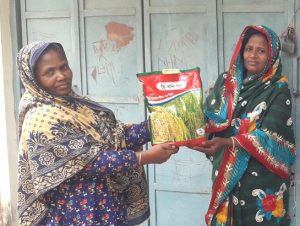By: Ruth Douglas
Scientific solutions that link interdisciplinary research with local communities are vital to tackling global hunger, amid the perfect storm of climate change and COVID-19, says the director of the new Norwich Institute for Sustainable Development (NISD). The World Food Programme warned in April last year that the COVID-19 pandemic would see around 265 million people in low- and middle-income countries suffering acute hunger by the end of 2020, up from 135 million.
“Many more who were on the borderlines of food security will be pushed into food insecurity,” warns Nitya Rao, director of the NISD, in the East of England. “We were on a downward trend [towards the UN goal of zero hunger], but this has now been reversed in a year.”
Meanwhile, yields of major staple foods like grains, fruits and vegetables are expected to decrease by between 3 per cent and 10 per cent per degree of global warming, according to the NISD.
“There have been a whole set of reports around biodiversity and climate in the past two years […] that say that the climate crisis is going to lead to not just a decline in yields of many food groups, but also in global inequality, in terms of food,” Rao adds.
“There are many issues in the last year that have converged so that business as usual is not going to help. Something drastic needs to happen. Something has to change.“
Rao hopes the new institute will contribute to that change as it develops solutions to help farmers around the world build resilience to rainfall variability, drought, and extreme weather events.
Working with engineers from the University of Manchester, in the UK, and Makerere University in Uganda, as well as members of a youth-led enterprise in Uganda, the institute has developed a low-cost way of tackling seed spoilage, often caused in transit or by lack of proper storage.
Real-time sensors, repurposed from existing technologies at a cost of around US$0.01 each, are attached to seed bags at the point of packaging to warn farmers of spoilage before purchase. Scientists hope the initiative will build trust in reliable modern seed varieties.
Another flagship programme is looking at how the drought-tolerant, protein-rich legume Grass pea (Lathyrus sativus) can be adapted to remove a harmful neurotoxin (β-ODAP) so that smallholder farmers can grow it for food and fodder.
Peter Emmrich, a John Innes Foundation fellow at the NISD, says in a video launching the institute: “These varieties will only have positive impacts if they fulfil farmers’ needs, are suitable to local environments, and are widely adopted. To this end, our biologists, social scientists, and historians are now working together to study farmer preferences, crop performance under climate stress and how different countries’ policies have affected its cultivation.”
These, says Rao, are just two examples of how the institute is marrying science and technology with social science, to provide sustainable solutions to local problems.
“When we’re thinking about the food system, we need to give a lot of attention to sustainability. Because so far this has not happened. And I think COVID has shown us… a lot of people went into hunger because of the dependence on transportation and value chains.“
The NISD brings together social scientists from the University of East Anglia’s School of International Development, and expertise from the John Innes Foundation, a Norwich-based charity dedicated to advancing plant science, as well as a number of other research institutes.
“At the NISD we are really trying to be cutting-edge in terms of developing both the problem statement and the solution in partnership with researchers in different disciplines, but also communities,” adds Rao.
“I’ve worked for 35 years with farmers in rural communities as a social scientist. The plant scientists, the agriculturalists may be doing the same. Now what we’re thinking is, we need to identify a problem from all these perspectives. Because if I’m a farmer, then I face all these problems at the same time.” – SciDev.Net
https://team-scidev.net/t/1SCG-79YCO-C8279D43DD2576F24SRI93616E74F37C7CBE1E/cr.aspx




